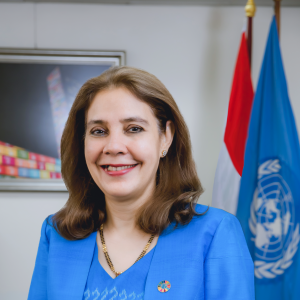- YE Bapak Sandiaga Uno, Minister of Tourism and Creative Economy
- Ibu Martini, Deputy Minister, Ministry of Tourism and Creative Economy
- Bapak Neil, Deputy Minister, Ministry of Tourism and Creative Economy,
- UN DESA colleagues
I am delighted to address you as we accelerate progress on leveraging Indonesians’ leadership in support of inclusively creative economy and the SDGs.
Last December, Indonesia played a pivotal role in the adoption of a resolution by the General Assembly on the creative economy as an integral part of sustainable development.
The resolution emphasizes the vital importance of cultural heritage and creative expressions.
It also calls on Member States to mainstream the creative economy into national development plans and bolster an enabling environment at all levels of society.
Your Excellency, your leadership has helped to make this a reality!
Moving forward, Indonesia’s lead on this agenda will be vital for a just, inclusive and green society in line with the SDGs.
SDG progress in country has been much more robust than the global average
with 62% of indicators on track.
Capitalizing on this momentum will be key to ensuring Indonesia’s goal of becoming a high-income country before mid-century with a dominant middle class.
Underlining this transformation will be Indonesia’s growing creative economy, which can leverage the potential of women and young people across cities and villages of the country.
We can tap into their can-do spirit in fine arts, fashion, filmmaking, animation, handicrafts, music, culinary arts, jewellery and many other creative endeavours.
In doing so, we can generate economic value while boosting inclusion.
Collectively, the creative economy already employs over 20 million people, predominantly women and youth, accounting for 13% of the workforce and contributing to 8% of GDP.
Exports from this sector have shown remarkable growth. The fashion, culinary, and craft sectors are the leading contributors to this impressive performance.
As Indonesia’s creative sector becomes more important in coming years, investing in circularity will be critical to a sustainable economy and broad-based inclusion.
As part of this, in partnership with the Global Compact Network, the UN is championing sustainable fashion and fabrics.
We have had our first dialogue with women designers from the Middle East, Africa and Asia on sustainability and we are working to leverage the international Fashion Week to shine a light on batik and other sustainable Indonesian products for global markets.
A key initiative involves scaling up the use of natural colours and traditional motifs as well as organic and halal-certified silk, cotton fabrics and branding products.
This is critical as sustainable fashion is more than just a passing trend. It is a growing global movement backed by increasing demand. Indonesia is leading by example on this by reviving traditional practices such as planting cotton trees to produce organic cotton for weaving.
Beyond the economic and environmental benefits, this will also bolster gender inclusion and reduce persisting wage gaps.
Enterprising women play a dominant role in Indonesia’s economy with nearly two-thirds of MSMEs owned by them.
However, their international footprint remains limited. To widen their horizons globally, ITC will organize a trade mission later this year to enable 20 women entrepreneurs specializing in textiles, footwear, and handicrafts to connect directly with buyers from the United Kingdom. Similar initiatives can have transformative effects.
In the same vein, ITC has supported over 300 women weavers from local villages in East Flores to receive hands-on training to produce export-quality placemats on long-term orders for a European multinational.
The women have said they will spread their newly learned skills to others in their communities, showing that once good practices are adopted, they can be spread very rapidly.
Beyond boosting its own creative economy, Indonesia is also well positioned to spread best practices and lessons learned to other nations in the spirit of South-South Triangular Cooperation.
The UN stands committed to supporting Indonesia to enable the country to
showcase its unique cultural heritage and creative outputs globally.
Thank you.




